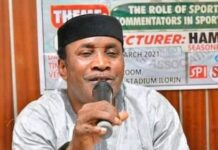By Ahmad Sajoh
The advent of Coronavirus otherwise called Covid 19 is indeed a major challenge for the whole world. To say Nigeria and indeed the World will be the same after this pandemic is to stretch naivety to the level of stupidity. Nothing will be the same again. Even the world order will be affected by the after effects of the pandemic. Covid 19 came as a pandemic, but the negative elements that accompanied the disease are many. One very obvious one is misinformation otherwise called “fake news” Others are suspicion, anxiety, nakedness of past failures in addressing society’s challenges, inadequate data on most operations of government which had been entrenched over the years by successive governments, and indeed the obvious need to reconfigure social relationships.If the World wanted to learn a major lesson from the effects of the pandemic, such lesson should be that the widening social gaps within societies have been a major setback for the development of humanity. As the world develops almost at the speed of light as a result of advances in technology, human beings are losing their humanity at an almost equal speed. Greed and self-centeredness have created unacceptable levels of social gaps across the world. Covid 19 has reminded all of us that when the chips are down we are all human. The pandemic has rampaged through society like a mad marauding army of destruction, killing King and Subject, master and slave, father and child and all that dares come on its way. Isolation, quarantine and lockdown became the new lexicon, and everyone uses them. With Covid 19, we are more the same than different. As always, in death we are all the same, buried by persons dressed in protective gear that will be properly disposed-off soon after.In the case of Nigeria, the rich and connected must rise up to the realization that their wealth and privileges are a trust from God. Perhaps that may explain the deluge of donations to support the fight against the pandemic. Covid 19 has demonstrated the emptiness of all the fancies of the rich. Air travel, expensive cars, mansions, medical tourism, and gate-away sessions to cooler countries during the peak of the heat season are all gone. The very big mansions hidden by super high walls and electric fences have suddenly become self-isolation centers rather than homes. The pride with which we were told about happenings during foreign trips suddenly turned mute. There is a sudden realization that unless we secure the entire society no one can be insulated from a ravaging pandemic. So we must return to the basics, begin to build a society anchored on our shared humanity with empathy for each other and believing that come what may, we have a common destiny – death. One of the reasons majority of rural as well as urban poor ignored warnings about the dangers associated with Covid 19 is because many of them live within the fringes of existence. There is little worth attached to their lives that the fears of death as a result of the pandemic will make more frightening. Before Covid 19 pandemic, most Nigerians see our major challenges as just those defined by our natural fault lines of Region, Religion and Ethnicity. But today the nature of our challenges have changed dramatically. For leaders the challenges have to do with managing an economy that no longer depends on free resources from a natural resource known as crude oil. With oil prices tumbling to below production costs and ships loaded with the commodity finding no buyers. The monthly ritual called Federation Account Allocation Committee meetings has become less of a jolly gathering. In addition, the handling of issues related to non-indigenes by some political leaders has raised serious questions on our nationhood. With dwindling resources and possible panic, leaders may likely recede to the dark recesses of micro nationalism for survival rather than the pragmatic requirements of a pan-Nigerian approach to addressing the situation. For the citizens, the increased manipulations of our natural fault lines by desperate micro nationalistic leaders will drive further wedges between them. The result may be excessive mistrust and even conflicts.Covid 19 has shown us that success in the war against the pandemic and indeed in any war, depends on effective mobilization of all citizens to be on the same page with the Government. It is now imperative that government develops a mechanism for connecting with citizens’ particular those engaged in the Informal sectors of the economy who in most cases are not captured by databanks developed for the formal sectors of the economy. The effects of this disconnect can be seen in the distribution of palliative to needy citizens. In all honesty, there were limitations regarding the means of identifying the needy within the society because majority of the citizens are not captured within any social net. Now is the time to consider returning a kind of poll tax in order to enable government develop a databank of taxable adults within communities. The poll tax was a small stipend paid as tax by all taxable adults who are not within the formal tax frameworks in the Country. It provided a databank at community level and established a link with community leadership structures. It also gave citizens the right to make demands on their governments. The post Covid 19 pandemic will require a new economic template that is anchored on the productive capacities of the citizens and an enhanced productive engagements in Agriculture, Manufacturing and Mining. If there is one key economic lesson learnt during this crisis, it is the fact that it is possible for nations to shut their doors to other nations and force each nation to carry their cross. The new economic template to be designed must begin by looking inwards to see how far we can go. We have tried it with Rice production. We may not be there yet, but because we have taken the right steps in the direction of self-reliance in rice production, we have made appreciable progress. We need to consolidate on that. We need to harvest all the new inroads made in the local design and production of various protection facilities and other medical necessities to challenge our scientists and inventors to go a step further and lead us to the path of self-reliance in most if not all our needs.Food security is a key concern for any nation and it will be a major concern after we exist the Covid 19 pandemic. A nation like an army marches on its stomach. It is indeed worthy of note that achieving food security goes beyond the ritual politics of fertilizer distribution. It requires a policy that develops and enhances the Agriculture value chain, creating benefits at all levels. Agricultural development is a social mobilization process not a matter of scoring cheap political point. In the Agriculture value chain, every contributor must be captured. It is part of the human nature for a person to demand for ‘what is in it for them’ in order to secure their buy-in. The value chain consist of not just the farmers, but includes providers of value added services such as mechanization, extension services, processors and marketers of Agricultural products. We must also consciously develop a strong connect between Agriculture and Industry. Why must we produce Cocoa and end up importing Chocolate? Why will our large number of cows be a source of security concern rather than a source of self-sufficiency in beef, dairy products and even skin for our leather requirements?Covid 19 will also challenge our social relationships, our ceremonies, our social gatherings, our travels, visits and even how gifts are given and received. But Covid 19 is not the first pandemic to visit the world. Like all previous pandemics such as the Spanish Flu of 1918, the pages of history books are already waiting for Covid 19 to be recorded and consigned to history like others before it. Eventually life will also return to normal, but that normal will be determined by the actions and inactions of both the leaders and citizens. If we all learn the lessons emanating from the pandemic and take the right steps to harvest the opportunities therein, it will very well end up a blessing in disguise. If we organize rather than agonize we shall be victors not vanquished. If we don’t, I hate to comtemplate. I am positive we will take the right steps including a Robust Social Mobilization strategy to enlist the citizens in the post Covid 19 recovery efforts. I am hopeful.
Ahmad Sajoh is a Public Affairs commentator and former Commissioner for Information and Strategy, he writes from Abuja. (08058421126 text messages only please)
Addressing the post- COVID-19 crisis
Follow Us On WhatsApp


